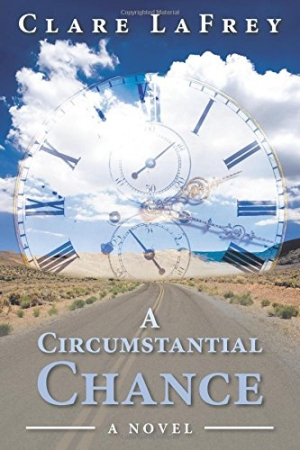A Circumstantial Chance
A Novel
A young girl starts a new life on a Nevada horse farm in this faith-filled YA novel.
Clare LaFrey’s first book, A Circumstantial Chance, introduces her young adult series, Fateful Consequences. In this opening installment, an adolescent girl from a single-parent family turns to faith to sustain her during suburban struggles and a new start out west. Although dialogue and action are lacking, this peek at troubled lives has a fresh setting.
Rita grew up with her grandparents in the Detroit suburbs; her mother, Coral, an exotic dancer addicted to alcohol, was largely absent. After her grandmother’s death and eviction from her grandfather’s apartment, Rita and her little brother, Toby, bounce between relatives’ houses and a children’s home. Only when Coral decides to drive to Nevada to see an old boyfriend do things look up. As puberty hits, Rita must adjust to a new school and life on a horse farm with God’s help. She also gets a taste of romance.
LaFrey is a registered nurse, and her background in mental health manifests itself in her sensitive portrayal of a dysfunctional family. Coral’s rebellious teen years help account for her failure as a mother. Yet Rita’s judgments feel harsh: “Clearly, Mom was unable to be a … responsible adult,” and her “lack of intelligence made me distraught.” Moreover, the psychological astuteness of these statements seems unrealistic from a preteen.
The book eventually comes alive with the road trip out west. LaFrey lives on a Montana ranch; her comfort with western scenery (nicely captured in the terrific cover image) and farm routine is clear. However, most of the novel is expository, with Rita describing her family circumstances and reporting on chores and school. There is a noticeable shortage of dialogue, as well as a tendency to skim over time periods that would benefit from action. For instance, bullying in Rita’s new town merits just a few sentences, as in “Therefore, I was fair game, and it was perfectly acceptable for adults and children alike, to ridicule and torture me.” This sentence also provides an example of the frequently superfluous commas.
Despite a thin veneer of Christianity, this book is not ideal for religious teenagers because of occasional sexual content. Mentions of faith come suddenly, seemingly out of nowhere; “Right then, I decided to thank God for all of his blessings,” Rita dutifully says. Contradicting the somewhat bleak overall story line, she smugly concludes, “I had been right about everything so far and now knew that God answered prayers.”
Fans of hard-knocks family memoirs like Jeannette Walls’s The Glass Castle or Brando Skyhorse’s Take This Man should enjoy Rita’s backstory, while younger readers of Jane Smiley’s equestrian series will enjoy the horse farm setting.
Reviewed by
Rebecca Foster
Disclosure: This article is not an endorsement, but a review. The publisher of this book provided free copies of the book and paid a small fee to have their book reviewed by a professional reviewer. Foreword Reviews and Clarion Reviews make no guarantee that the publisher will receive a positive review. Foreword Magazine, Inc. is disclosing this in accordance with the Federal Trade Commission’s 16 CFR, Part 255.

